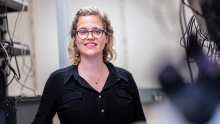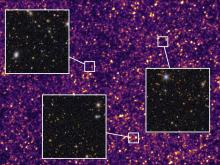UBC has partnered with US-based Coursera to offer genetics, computer science and climate literacy courses online--bringing the university’s expertise within reach of anyone with Internet access.
Starting spring 2013, UBC will pilot three non-credit courses taught by renowned UBC faculty and researchers through Coursera’s online learning platform.
Coursera was founded in 2011 by two Stanford University professors to transform teaching and learning through Massive Open Online Courses (MOOCs). Partnering with top-tier universities that include Stanford, Princeton and the University of Pennsylvania, Coursera currently enrolls more than 1.3 million students from 196 countries, and with today’s addition of courses, the platform hosts more than 200 courses across a broad range of disciplines.
"Our partnership with Coursera will enable us to reach people around the world, and to evaluate an exciting new teaching and learning technology," says Simon Peacock, Dean of the Faculty of Science, where two of the three UBC Coursera courses will be housed.
"Ultimately, I believe all UBC students will benefit from our exploration of this rapidly evolving online space."
UBC’s Coursera offerings are “Useful Genetics” with Prof. Rosie Redfield, “Computer Science Problem Design” with Prof. Gregor Kiczales and “Climate Literacy: Navigating Climate Conversations” with Sarah Burch and Tom-Pierre Frappé-Sénéclauze, instructors for the UBC Continuing Studies Centre for Sustainability.
Coursera courses typically consist of videos or voice-over PowerPoint presentations, with student-led discussion forums, interactive activities, quizzes and assignments set at regular intervals.
For a video of UBC microbiologist Prof. Redfield, named one of Nature's 2011 newsmakers, visit: http://tinyurl.com/94akbey
For more UBC information and videos, visit: https://www.coursera.org and http://open.ubc.ca/coursera/
Background
- In addition to UBC, other universities joining Coursera today are Berklee College of Music, Brown University, Columbia University, Emory University, Hebrew University of Jerusalem, Hong Kong University of Science and Technology, Mount Sinai School of Medicine, Ohio State, University of California, Irvine, University of Florida, University of London, University of Maryland, University of Melbourne, University of Pittsburgh, Vanderbilt and Wesleyan University.
- UBC is building upon its leadership in continuing and distance education to enhance the student learning experience. The Coursera partnership will provide evidence-based findings for UBC to design and support quality learning interactions for online, face-to-face and other classroom delivery modes.
- Instructors will determine the duration and content of their courses, which are expected to range from eight to 10 weeks. UBC’s pilot courses are non-degree, non credit; UBC students will not be able to substitute a Coursera course as part of their for-credit curriculum.
- UBC instructors will use the forms of online testing and assessment that they believe will best support students’ ability to achieve the expected learning outcomes of the course.


